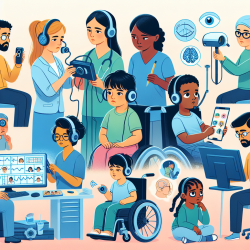Mental health challenges are increasingly prevalent among post-secondary students. The transition to college or university often brings about significant stressors, including academic pressures, social changes, and increased responsibilities. According to recent studies, a substantial number of students report experiencing anxiety and depression, with some even contemplating suicide. Addressing these issues promptly is crucial for the well-being of students and the overall educational environment.
The Need for Comprehensive Tools
Traditional mental health screening tools often focus on specific diagnosable conditions and lack the flexibility needed to address the diverse experiences of students. Moreover, these tools frequently do not provide adequate resource navigation support, which is essential for connecting students with appropriate services. To bridge this gap, the HEARTSMAP-U tool was developed as an adaptation of existing psychosocial assessment tools tailored specifically for post-secondary students.
Development of HEARTSMAP-U
The creation of HEARTSMAP-U involved a multi-phase process that included collaboration between mental health professionals and student focus groups. This approach ensured that the tool was both clinically valid and relevant to the student population. The tool assesses ten psychosocial areas such as housing stability, education and activities, relationships, mood, and substance use.
Phase One: Collaborative Working Meetings
A diverse team of experts and students worked together to adapt the existing HEARTSMAP framework to meet the unique needs of post-secondary students. This phase focused on ensuring that the tool addressed relevant psychosocial stressors and provided actionable resource recommendations.
Phase Two: Clinical Expert Review
Mental health clinicians evaluated the tool's content through a cross-sectional survey. Their feedback helped refine the guiding questions and scoring criteria to better capture the range of concerns that students might experience.
Phase Three: Student Focus Groups
Focus groups with diverse student participants were conducted to ensure that the tool's language and content were comprehensible and relevant. Students provided valuable insights into how the tool could be improved to better reflect their experiences.
Implementing HEARTSMAP-U in Practice
For practitioners looking to enhance their skills in addressing student mental health needs, implementing HEARTSMAP-U can be highly beneficial. The tool provides a comprehensive assessment of psychosocial challenges and offers resource recommendations based on urgency. This can help practitioners identify issues early and connect students with appropriate support services more efficiently.
- Early Detection: By using HEARTSMAP-U, practitioners can identify mental health concerns before they escalate into more severe issues.
- Resource Navigation: The tool offers tailored recommendations that guide students toward suitable resources, reducing barriers to accessing care.
- User-Friendly Interface: The digital format allows for easy administration and encourages honest self-assessment by providing privacy.
- Comprehensive Coverage: With ten psychosocial areas assessed, practitioners gain a holistic view of a student's mental health landscape.
Encouraging Further Research
The development of HEARTSMAP-U highlights the importance of adapting mental health tools to meet the specific needs of different populations. Practitioners are encouraged to engage in further research to explore the quantitative psychometric properties and clinical utility of such tools in various educational settings. By doing so, they can contribute to improving mental health outcomes for students across institutions.
To read the original research paper, please follow this link: HEARTSMAP-U: Adapting a Psychosocial Self-Screening and Resource Navigation Support Tool for Use by Post-secondary Students.










